10 Best Herbal Teas For Depression

Herbal teas have gained popularity as a natural remedy for managing symptoms of depression, offering a calming and soothing alternative to conventional treatments.
Certain herbs like St. John's Wort, lavender, and chamomile are commonly used in herbal teas due to their potential mood-enhancing properties. These teas work by promoting relaxation, reducing anxiety, and improving sleep, which are often linked to depressive symptoms. While they are not a substitute for professional mental health care, they can be a helpful complementary therapy when used under the guidance of a healthcare provider.
Overall, herbal teas provide a gentle and accessible way to support emotional well-being, though their effectiveness may vary among individuals.
Table of Contents
- 1. St. john's wort (Hypericum perforatum)
- 2. Valerian (Valeriana officinalis)
- 3. Maypop (Passiflora incarnata)
- 4. Licorice (Glycyrrhiza glabra)
- 5. Lemon balm (Melissa officinalis)
- 6. Golden root (Rhodiola rosea)
- 7. Chaste tree (Vitex agnus-castus)
- 8. Salvia (Salvia officinalis)
- 9. Camellia (Camellia sinensis)
- 10. Heartworts (Leonurus cardiaca)
1. St. john's wort (Hypericum perforatum)

Hypericum perforatum, commonly known as St. John's Wort, is a herbal remedy that has been traditionally used to alleviate symptoms of mild to moderate depression.
Its active compounds, including hypericin and hyperforin, are believed to influence neurotransmitters such as serotonin, dopamine, and norepinephrine, which play a key role in mood regulation. Hypericum perforatum herbal teas are often prepared by steeping the dried plant material in hot water, making them a convenient and accessible option for those seeking natural treatment. While some studies suggest its effectiveness comparable to certain antidepressants, it is important to consult a healthcare professional before use due to potential interactions with other medications.
Overall, hypericum perforatum herbal tea may offer a complementary approach to managing depression, though it should not replace professional medical advice or treatment.
2. Valerian (Valeriana officinalis)
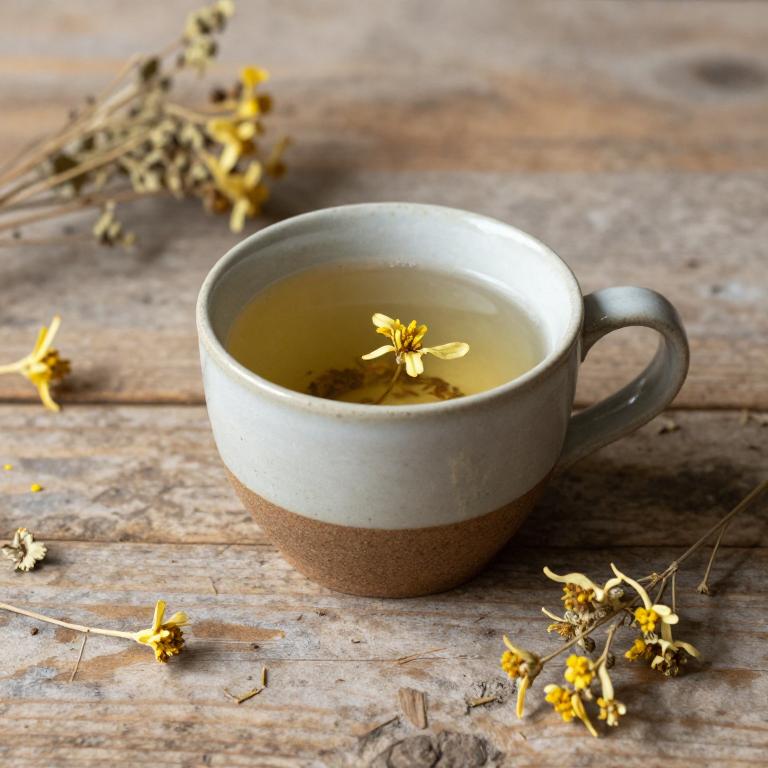
Valeriana officinalis, commonly known as valerian, is a traditional herbal remedy often used to address mild depressive symptoms and promote relaxation.
Its active compounds, such as valerenic acid and sesquiterpenes, are believed to influence the central nervous system by increasing levels of gamma-aminobutyric acid (GABA), which helps reduce anxiety and improve mood. Valerian tea is typically prepared by steeping the dried root in hot water, and it is often consumed in the evening to support sleep, which is closely linked to emotional well-being. While scientific evidence on its efficacy for depression is limited, many users report a calming effect that may contribute to overall mood improvement.
As with any herbal remedy, it is advisable to consult a healthcare professional before use, especially for individuals with existing mental health conditions or those taking other medications.
3. Maypop (Passiflora incarnata)
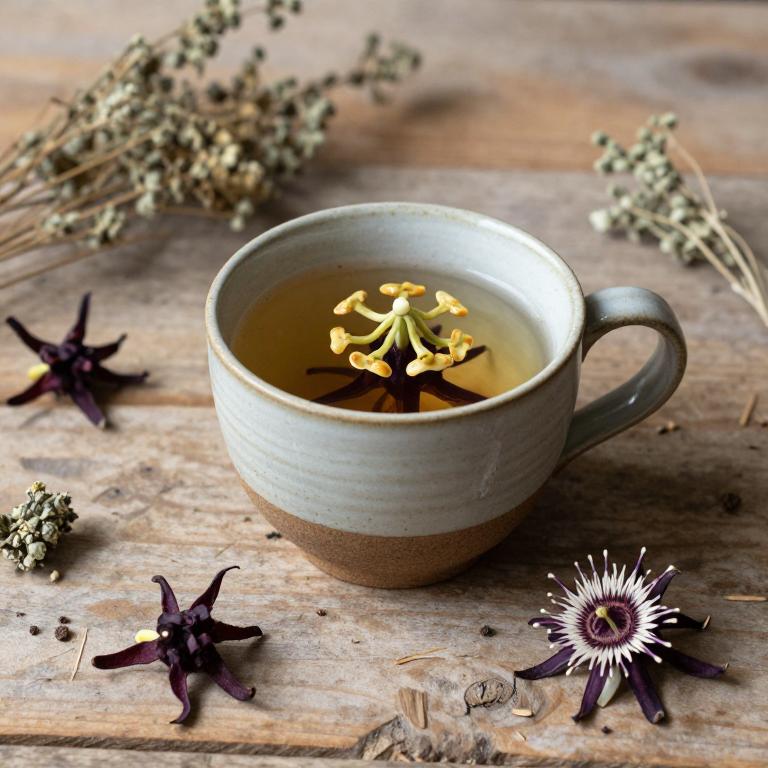
Passiflora incarnata, commonly known as passionflower, is a herbal remedy traditionally used to support mental well-being and alleviate symptoms of depression.
This plant contains compounds such as flavonoids and alkaloids that may help regulate neurotransmitters like serotonin and GABA, promoting a sense of calm and emotional balance. Passionflower herbal teas are often consumed as a natural alternative to conventional antidepressants, offering a gentler approach with fewer side effects. Studies suggest that regular consumption of passionflower tea may reduce anxiety and depressive symptoms, though more research is needed to confirm its efficacy.
As with any herbal remedy, it is important to consult a healthcare professional before use, especially for individuals with existing medical conditions or those taking other medications.
4. Licorice (Glycyrrhiza glabra)

Glycyrrhiza glabra, commonly known as licorice root, has been traditionally used in herbal medicine for its potential antidepressant effects.
Research suggests that the active compounds in licorice root, such as glycyrrhizin and liquiritigenin, may influence neurotransmitter activity and reduce inflammation, which are linked to mood disorders. Herbal teas made from licorice root are often consumed for their soothing properties and may help alleviate symptoms of mild depression when used as part of a holistic approach. However, it is important to note that licorice root should be used cautiously, as excessive consumption can lead to side effects like hypertension.
As with any herbal remedy, it is advisable to consult a healthcare professional before incorporating licorice tea into a treatment plan for depression.
5. Lemon balm (Melissa officinalis)
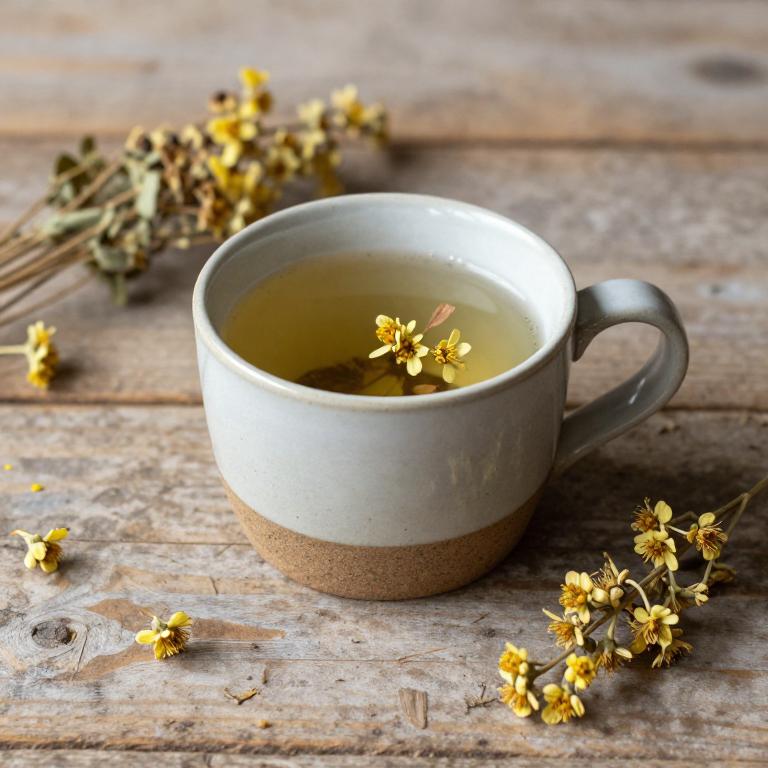
Melissa officinalis, commonly known as lemon balm, is a popular herbal remedy used to support mental wellness, including the management of symptoms of depression.
This herb contains compounds such as rosmarinic acid and flavonoids, which may help regulate mood and reduce anxiety by influencing neurotransmitter activity in the brain. Lemon balm herbal teas are often consumed as a calming drink, offering a natural alternative to conventional antidepressants with fewer side effects. Studies suggest that regular consumption of lemon balm tea may improve mood and enhance overall emotional resilience.
However, it is important to consult with a healthcare professional before using lemon balm, especially if taking other medications or supplements.
6. Golden root (Rhodiola rosea)
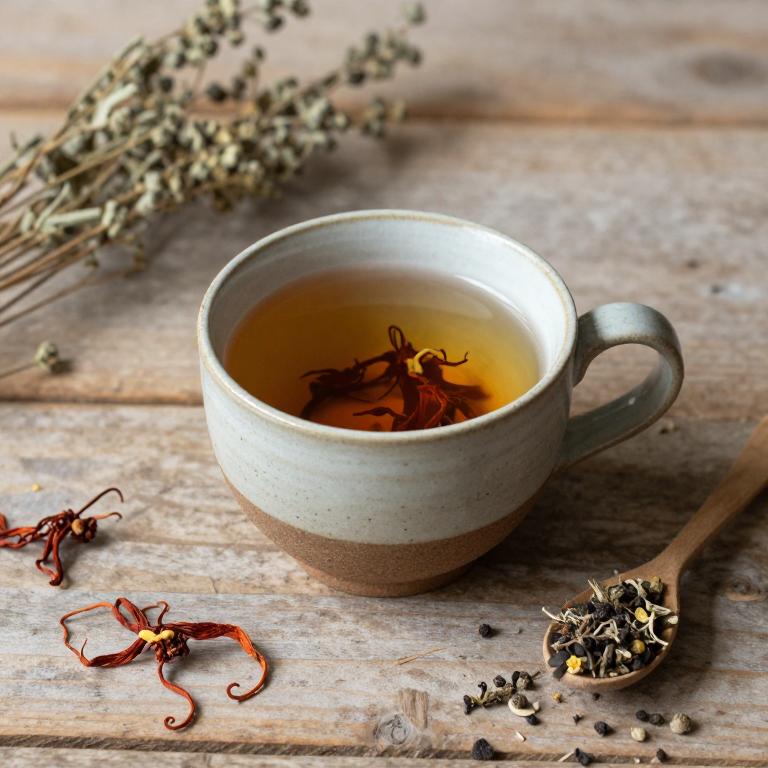
Rhodiola rosea, also known as the "golden root," is an adaptogenic herb that has been traditionally used to enhance physical and mental performance.
Herbal teas made from Rhodiola rosea are gaining popularity for their potential to alleviate symptoms of depression by supporting the body's ability to cope with stress. Studies suggest that Rhodiola rosea may help regulate neurotransmitter levels, such as serotonin and dopamine, which play a key role in mood regulation. These teas are often consumed as a natural alternative or complement to conventional antidepressant treatments.
However, it is important to consult a healthcare provider before using Rhodiola rosea, especially for individuals with existing health conditions or those taking other medications.
7. Chaste tree (Vitex agnus-castus)

Vitex agnus-castus, commonly known as chasteberry, has been traditionally used in herbal medicine for its potential mood-regulating properties.
Herbal teas made from vitex are often consumed to support emotional balance and alleviate symptoms of mild depression by influencing hormonal pathways, particularly those involving prolactin and estrogen. Research suggests that vitex may help reduce anxiety and improve mood by modulating neurotransmitter activity in the brain. While it is not a substitute for professional mental health treatment, it can be a complementary approach for some individuals seeking natural remedies.
As with any herbal remedy, it is important to consult with a healthcare provider before use, especially if taking other medications or having underlying health conditions.
8. Salvia (Salvia officinalis)

Salvia officinalis, commonly known as sage, has been traditionally used in herbal teas to support mental well-being and alleviate symptoms of depression.
Rich in antioxidants and anti-inflammatory compounds, sage may help reduce oxidative stress and improve mood by supporting brain function. Studies suggest that sage tea may enhance cognitive performance and emotional resilience, making it a potential natural remedy for mild depressive symptoms. Its calming properties can promote relaxation and reduce anxiety, which are often linked to depression.
While it should not replace professional treatment, sage herbal tea can be a complementary option for those seeking holistic approaches to managing their mental health.
9. Camellia (Camellia sinensis)

Camellia sinensis, the plant from which green, black, and white teas are derived, contains bioactive compounds such as polyphenols, caffeine, and amino acids that may influence mood and mental well-being.
Some studies suggest that the antioxidants in Camellia sinensis can help reduce oxidative stress, which is often elevated in individuals with depression. While not a substitute for professional treatment, herbal teas made from Camellia sinensis may support overall mental health when consumed as part of a balanced lifestyle. However, the effects can vary among individuals, and it is important to consult with a healthcare provider before using tea as a complementary therapy for depression.
The combination of caffeine and L-theanine found in Camellia sinensis may also promote relaxation and enhance cognitive function, potentially offering mild mood-enhancing benefits.
10. Heartworts (Leonurus cardiaca)
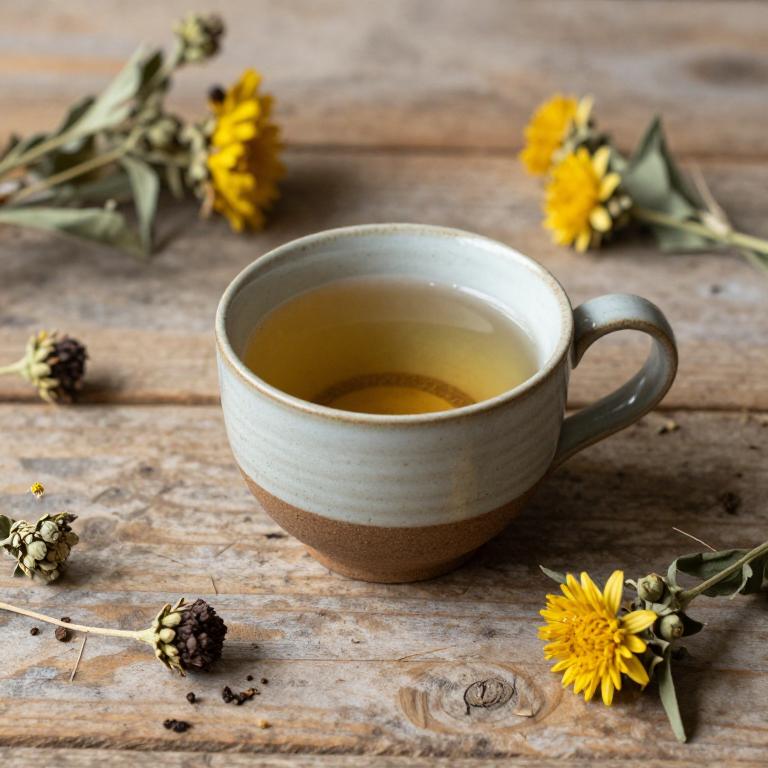
Leonurus cardiaca, commonly known as heartworts, has been traditionally used in herbal medicine for its potential antidepressant properties.
This plant contains bioactive compounds such as flavonoids and iridoids, which may contribute to its mood-enhancing effects. Herbal teas made from Leonurus cardiaca are often prepared by steeping the dried leaves and flowers in hot water, allowing the beneficial compounds to infuse into the liquid. Some studies suggest that regular consumption of this tea may help alleviate symptoms of mild depression by promoting relaxation and improving emotional well-being.
However, it is important to consult with a healthcare professional before using Leonurus cardiaca, especially for individuals with existing health conditions or those taking medications.